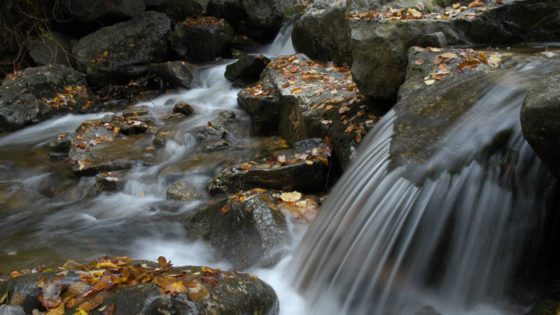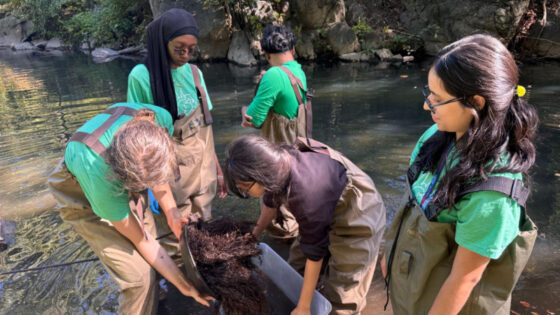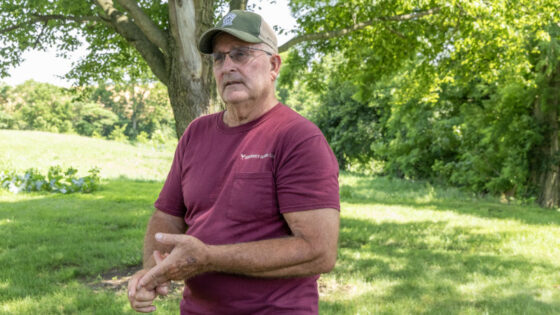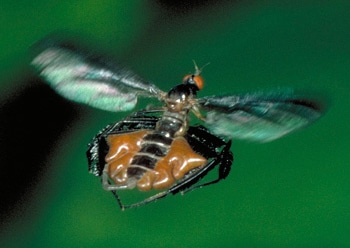
Food’s the Prize for Female Flies Looking to Mate
For the long-tailed dance fly, every night is ladies’ night. On March 3, students in Doug Tallamy’s insect ecology class at the University of Delaware learned why.
Stroud Water Research Center entomologist Dave Funk, gave a lecture titled “Sex Role-Reversed Courtship in the Long-Tailed Dance Fly Rhamphomyia longicauda.”
He explained how these resourceful females use their feminine wiles to initiate courtship — Sadie Hawkins style. Sucking in air, they distend their abdomens to mimic egg development, and the males, who prefer the rounder, fertile shape, respond to the invitation with food gifts.
It’s a high-stakes dance for the female flies since they cannot hunt prey and thus rely on their beaus to bring home the protein.
Ongoing Work Reaches Global Audience
Improving Survivorship of Tree Plantings
Later in March, Stroud Center Director Bern Sweeney followed Funk’s crash course on the birds and the bees with a presentation about trees.
On March 8, he attended a TreeVitalize Partners Meeting in Philadelphia to explain the latest developments in improving the survivorship and growth of TreeVitalize tree plantings.
Hosting International Visitors
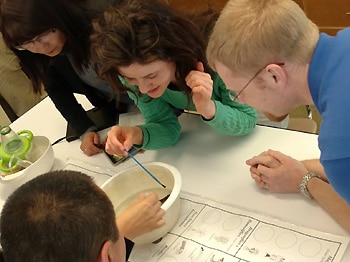
Then on March 18, Sweeney, along with Education Director Steve Kerlin and Assistant Director of Education Tara Muenz, introduced the Stroud Center’s research, education, and restoration activities to a group from the International Visitor Leadership Program for Water Resources Management.
For the last several years, the Stroud Center has hosted visitors from around the world who attend the program.
Launched in 1940, the International Visitor Leadership Program seeks to build mutual understanding between the United States and other nations through carefully designed professional visits for current and emerging foreign leaders.
Thermal Challenges Facing Fish

In February, Valérie Ouellet, Ph.D., postdoctoral research associate, traveled to Melbourne, Australia, for the 11th International Symposium on Ecohydraulics. On the 12th, she presented a paper she and Melinda Daniels, Ph.D., associate research scientist, authored: “Travelling Downstream: Thermal Challenges Facing Fish.”
Water temperature can affect the survivorship of brook trout and other fish. Ouellet and Daniels found that the mosaic of riparian landscapes limits the connectivity between suitable cold-water habitats when too few forested patches are present or if they are not evenly distributed through the watershed, thus limiting fish movement in the stream.
Stroud Teaches
Education Department Presents “Trout Grow on Trees” to Pa. Environmental Educators
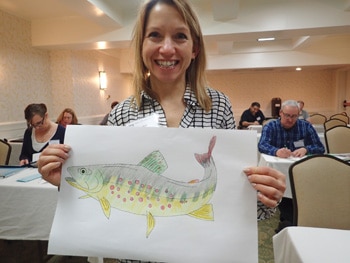
The Pennsylvania Association of Environmental Educators (PAEE) held its annual conference in the Poconos this past March. Surrounded in a gorgeous setting, teachers, naturalists, students, and Stroud Water Research Center education staff came together to engage in environmental education.
Making its debut with the PAEE community was the education department’s Trout Grow on Trees Program®. Tara Muenz led attendees in a session to learn about the Stroud Center, the importance of streamside forests, how to make watershed tea, and many of the watershed stewardship tools now available from the Stroud Center. By the end, the whole group knew why and how Trout Grow on Trees!
Check out these other recent presentations by the Stroud Center’s education department:
- Kerlin, S., (February 26–27, 2016) (Exhibit). Stroud Center restoration and education outreach programs at the Keystone Coldwater Conference, State College, Pa.
- Muenz, T., (February 27, 2016) (Exhibit). Stroud Center education programs at the Delaware Association for Environmental Educators State Conference, Tatnall High School, Wilmington, Del.
- Stroud Center Personnel (March 12, 2016). (Exhibit). Stroud Center WikiWatershed, Model My Watershed, and sensors at the Schuylkill Watershed Congress, Pottstown, Pa.
- Aufdenkampe, A., Daniels, M., & Muenz, T. (March 12, 2016). (Oral). Model My Watershed v2: An Online Professional Toolkit for Restoration in the Delaware River Basin at Schuylkill Watershed Congress, Pottstown, Pa.
- Muenz, T., Kerlin, S., & Gregg, L. (March 13–15, 2016). (Exhibit). Stroud Center education programs at the Pennsylvania Association for Environmental Educators State Conference, Pocono Manor, Pa.
- Muenz, T., (March 31, 2016) (Two Oral Sessions). Slimy Leaves for Healthy Streams. National Science Teacher Association Conference. Nashville, Tenn. Sponsored by the LaMotte Company.
- Marcum-Dietrich, N., Hess, M., Staudt, C. Muenz, T. (April 1, 2016) (Oral). Model My Watershed: Using Local Data to Make Local Decisions. National Science Teacher Association Conference, Nashville, Tenn.
- Marcum-Dietrich, N., Hess, M., Staudt, C. Muenz, T.(April 1, 2016) (Oral). Teaching Environmental Sustainability With the Model My Watershed Application. National Science Teacher Association Conference, Nashville, Tenn.
Stroud Restores
Since January, the Watershed Restoration Group has reached approximately 2,300 people with a message to restore and protect freshwater resources. Matt Ehrhart, David Wise, Lamonte Garber, and Stephanie Eisenbise, presented on topics related to farm stewardship, watershed management and research, riparian buffers and stream health, and more.
Here’s a list of just some of the groups reached:
- Pennsylvania No-Till Alliance
- Chesapeake Bay Forest Buffer Summit
- Berks County Conservation District and Penn State Extension
- Individual farmers
- White Clay Creek Wild & Scenic Steering Committee
- Chiques Creek Winter Farmers

